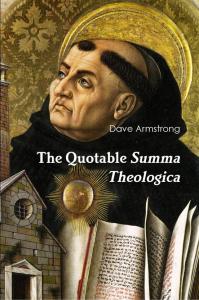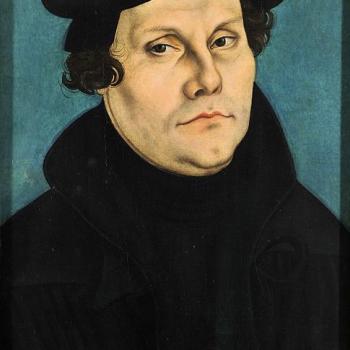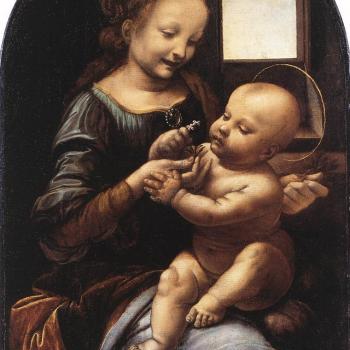“Please Hit ‘Subscribe’”! If you have received benefit from this or any of my other 4,600+ articles, please follow this blog by signing up (with your email address) on the sidebar to the right (you may have to scroll down a bit), above where there is an icon bar, “Sign Me Up!”: to receive notice when I post a new blog article. This is the equivalent of subscribing to a YouTube channel. Please also consider following me on Twitter / X and purchasing one or more of my 55 books. All of this helps me get more exposure, and (however little!) more income for my full-time apologetics work. Thanks so much and happy reading!
***
“Turretinfan” is an illustrious anti-Catholic Reformed Protestant apologist. He put up an interesting post entitled, “Early Thomas Aquinas contra the Immaculate Conception (5-1-24). I’d like to comment on it (and dare to disagree with and respectfully critique the great St. Thomas Aquinas). I’m not a Thomist, but I have the utmost respect for St. Thomas (1225-1274): so much so that one of my books that I edited is The Quotable Summa Theologica (Jan. 2013, 200 pages). I used to also have a web page devoted to St. Thomas in the early days of my website (begun in 1997). But individuals and theologians can be wrong, according to Catholic teaching: even those as eminent and gifted as Aquinas and Augustine. Here is most of Turretinfan’s article:
***
Thomas Aquinas is one of the most notable theologians of the medieval period. One of Thomas’ earlier works was his commentary on Peter Lombard’s Sentences. At Sentences, III, D3, Q1, Thomas considers “the Sanctification of the Blessed Virgin,” and specifically, “Concerning the first question, two things are to be looked into: first, the time of her sanctification; [and] second, its effects.”
Article 1 asks whether Mary was sanctified “before her conception was completed.” Thomas then considers multiple question-ettes (questinculae).
In his “Response to Quaestinucula 1,” he concludes that “it should be said that there is no way she could have been sanctified in her parents, nor even in the very act of her conception.”
In his “Response to Quaestincula 2,” he concludes that “it should be said that the Blessed Virgin’s sanctification could not have occurred in a becoming way before the infusion of her soul, because she was not yet capable of grace, but also not in the very instant of its infusion, such that by grace infused into her at that time she would be preserved from incurring original sin. For Christ was unique in the human race in not needing redemption, for he is our head, but all share in needing to be redeemed through him. Now, this could not be if any other soul were found that had never been infected by the original stain. And therefore this was not granted to the Blessed Virgin or anyone other than Christ.”
In his “Response to Quaestincula 3,” he concludes that “it should be said that the Blessed Virgin was sanctified before her birth from the womb, which can be gathered from the fact that she above all the other saints was most pure from sin, as the text states, as the chosen mother of divine Wisdom, in which no defilement occurs, as it says in Wisdom 7:22. Whence, since this purity may be found to have existed in some people such that they were cleansed before their birth from the womb—such as John the Baptist, of whom we read in Luke 1:15, he will be filled with the Holy Spirit, even from his mother’s womb; and Jeremiah, of whom it says, before I formed you in the womb I knew you, and before you were born I consecrated you (Jer 1:5)—one should not doubt that this was bestowed on the Mother of God in a much more excellent way.”
***
First of all, in St. Thomas’ time of very primitive biology, it was not thought that the soul was created at the instant of conception. Thus, the prerequisite knowledge required to believe in Mary’s immaculate conception (i.e., the specific timing of it) was lacking. So we are left with the question of when the special grace and sanctity granted to Mary was given by God, if it was not from the beginning of her existence. The belief at the time was that the soul was infused sometime after conception.
The Catholic dogma of the Blessed Virgin Mary’s Immaculate Conception — nor the prior longstanding pious belief — never claimed, to my knowledge, that the grace given to her by God occurred before her conception. This is evident in its very title. So that is neither here nor there. Nor does it have anything whatsoever to do with Mary’s parents.
It was a purely gratuitous act of God at the moment she was conceived. Of course, prior to her conception, it was the will of God from all eternity to sanctify her in this extraordinary and singular way. In that sense and that alone, it existed prior to Mary’s conception. But that is potentiality and not actuality.
St. Thomas states: “it should be said that there is no way she could have been sanctified in her parents, nor even in the very act of her conception.” My question to him, were I a pupil in a classroom of his (oh the glorious thought!), discussing this topic, would be, “on what basis, esteemed master, do you believe that there is ‘no way‘ that this could have happened?” Later in the same section, St. Thomas writes that “it is uncertain exactly when that [‘her sanctification’] took place.” What puzzles me is how St. Thomas admits that the time is uncertain, yet rules out even the possibility of it being present from the moment of the existence of her soul (whenever that was deemed to be in that pre-biological time).
Also in the same section, speculating about the relation of Mary’s parents to her sanctification, he writes, “this God could certainly have done, but it would not have been fitting.” No one questions that God could and would have done whatever He chose to do. But then again, I ask, “why not from conception?” In another response, Aquinas opined, “the Blessed Virgin’s sanctification could not have occurred . . . in the very instant of [her soul’s] infusion, . . .” Again, I wonder, why did he believe this? What is it based on? What caused him to reject it seemingly out of hand? He goes on to state, “Christ was unique in the human race in not needing redemption, for he is our head, but all share in needing to be redeemed through him.”
What didn’t seem to occur to him, but did occur shortly afterwards to Blessed Duns Scotus, was that the act of God’s sanctification, making Mary immaculate from the beginning of her human existence, was itself a redeeming and saving act (“preredemption,” as it were). But for that, Mary, of course, would have inherited original sin like anyone else. God simply chose to remove it at the very instant that it would have started to exist. It’s all God at that point, and none of Mary. Mary had a savior, as we all did. Without His grace, she would not have been immaculate or sinless. But she did cooperate with the grace, as we all do, or should.
What I find even more interesting is how St. Thomas goes on to argue that “the Blessed Virgin was sanctified before her birth from the womb, which can be gathered from the fact that she above all the other saints was most pure from sin.” Thus, he held that she did indeed attain to a state of sublime holiness “above all the other saints.” It happened at some point in her mother’s womb. He cites the analogies of John the Baptist and the prophet Jeremiah (arguments I have used in my own defenses of the Immaculate Conception): who were “were cleansed before their birth from the womb.”
I submit that we can’t deny that their purifications occurred at their own conceptions, either. But we know for sure — from inspired revelation — that this happened before they were born. Aquinas concludes that “this was bestowed on the Mother of God in a much more excellent way.”
The point of tension that I see in his position is that St. Thomas grants that the Blessed Virgin was extraordinarily sanctified in the womb. That was the act of grace. Yet he fails to see the interior logic and “fittingness” of that being from her conception (or at least when her soul was infused, which he thought came later). If God sanctified her later in her time in the womb, why not earlier? What principle or reason precludes that? And He doesn’t seem to realize that this act of grace contained in it redemption and salvation (since it eliminated original sin).
Mary was simply saved in a deeper and more profound way than others who are in the company of the elect. St. Thomas saw the essence of what the later dogma clarified, but he doesn’t quite put it all together in its completeness and glorious “fittingness.” That’s okay, though. He was a human being like we all are. The development of doctrine takes centuries of the Holy Spirit enlightening holy and intellectually brilliant and wise minds. We have the benefit of hindsight. We’re mere “armchair quarterbacks.”
Even Protestants believe the same thing. Lutheran pastor and scholar Jordan Cooper stated in one of his YouTube videos that no one understood certain important aspects of justification until the 16th century. No one “got” this aspect, central to salvation, till Martin Luther came around. If that took fifteen centuries, what’s to prevent a full understanding of Mary’s Immaculate Conception from taking 1200 years? Protestants are the very last people who can rationally complain about doctrines taking a long time to be fully developed and understood.
Once the Church in her magisterium declares and dogmatizes, it’s fascinating to go back and see how closely the holy saints and great and wise theological minds approached the finally formulated dogma.
*
Practical Matters: Perhaps some of my 4,600+ free online articles (the most comprehensive “one-stop” Catholic apologetics site) or fifty-five books have helped you (by God’s grace) to decide to become Catholic or to return to the Church, or better understand some doctrines and why we believe them.
Or you may believe my work is worthy to support for the purpose of apologetics and evangelism in general. If so, please seriously consider a much-needed financial contribution. I’m always in need of more funds: especially monthly support. “The laborer is worthy of his wages” (1 Tim 5:18, NKJV). 1 December 2021 was my 20th anniversary as a full-time Catholic apologist, and February 2022 marked the 25th anniversary of my blog.
PayPal donations are the easiest: just send to my email address: apologistdave@gmail.com. Here’s also a second page to get to PayPal. You’ll see the term “Catholic Used Book Service”, which is my old side-business. To learn about the different methods of contributing (including Zelle), see my page: About Catholic Apologist Dave Armstrong / Donation Information. Thanks a million from the bottom of my heart!
*
***
Summary: St. Thomas Aquinas got very close to the later defined dogma of Mary’s Immaculate Conception. What he got wrong in retrospect is fascinating to analyze.


















